Post
A catch
Save a catch to start your fishing logbook. You will be able to to share it with the community if yo want!
A fishing trip
Post an ad to go fishing with other fishermen
Save a catch to start your fishing logbook. You will be able to to share it with the community if yo want!
Post an ad to go fishing with other fishermen
Share a thought, a question with the community
My favorite cities
×Join our 1 fisherman in Big-Oak-Flat in Tuolumne. The fishing forecast is currently 4.4. The most caught fishes here are the american shad, the pallid sturgeon, the paddlefish and the pacific lamprey. Come try the most famous fishing techniques like the trolling, fishing with traps, barracuda trolling or bass trolling.
Our fishing forecast of Big Oak Flat indicates the best time to go fishing in this city.
The American Shad
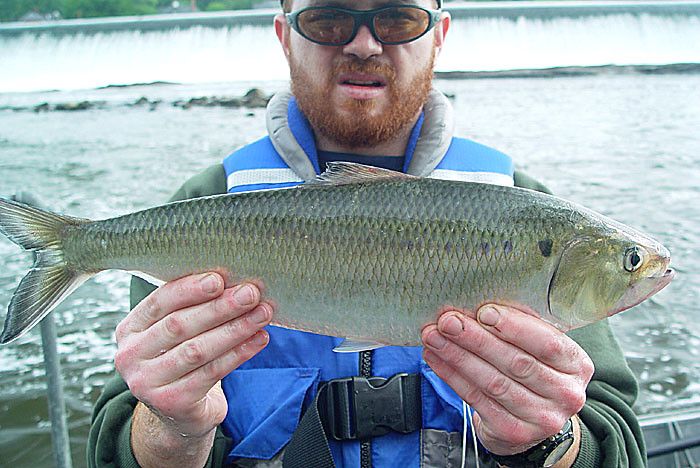
The American Shad belongs to the Clupeidae family. With an average of 38 cm, adult specimens can measure up to 76 cm and weigh between 0.9 and 1.4 kg. It can live up to 13 years old. Egg laying takes place in May, June or July. On average, the female lays 140,000 eggs, but can reach 600,000 eggs. It is fished in the spring. The American shad is characterized by its slender, high and very flattened body. The species has a very forked caudal fin and a low, elongated anal fin. It has no lateral line or adipose fin. Its color is silvery with a blue or blue-green sheen on the back and bright silver flanks. When entering fresh water for reproduction, the pigmentation may become darker, taking on a tan or copper hue, turning red for the head and belly parts. A black spot is visible near the top edge of the lid, sometimes followed by smaller spots. Its lower jaw fits into a notch in its upper jaw. It can also be recognized by its large scales that are easily detached. The ventral surface of the American shad is thin with saw tooth scales. With regard to internal characteristics, it has teeth in the premaxillary and lower jaw, a silver peritoneum and, between 53 and 59 vertebrae.
The American Shad is a famous fish you can catch in Big Oak Flat.The Pallid Sturgeon
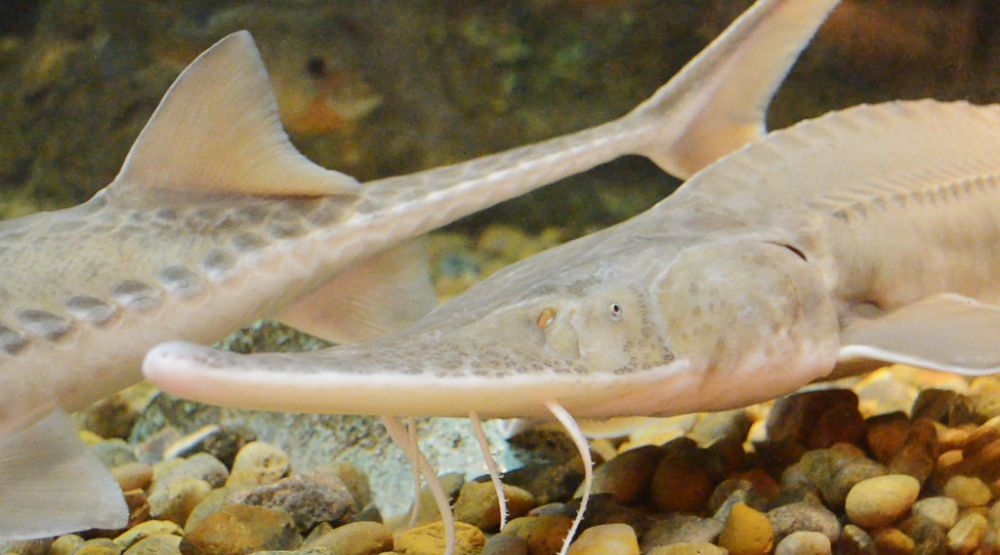
The Pallid Sturgeon belongs to the Acipenseridae family. it measures between 70 and 150 cm long and 39 kg in adulthood. The Pallid Sturgeon takes 15 years to reach maturity, and can live for more than a century. it breeds from May to July. Considered as endangered, it cannot be caught. Like the other Acipenseridae, it is considered as a "living fossil". The Pallid Sturgeon has a characteristic appearance that makes it to be qualified as "primitive" or "dinosaur". It has a pale color, especially in adults who fade with time, with a greyish back and sides. Its caudal fin is heterocercal, with an upper lobe more developed than the lower lobe. Like other sturgeons, the Pallid Sturgeon has no calcified scales or bones, unlike more recent fish species. It has a cartilaginous skeleton with five rows of thick patches that extend along its sides, belly, back and most of its head. These plates are covered by the skin and protect the animal. This cartilage also extends to the back of the fish’s body, between the dorsal fin and the tail. The mouth starts well set back from the tip of the head. Because it has no teeth, it uses this stretchy mouth to suck small fish, shellfish and other foods from the bottom of the river. Like all sturgeons, it has four barbells. We think they have a sensory role in detecting food.
The Pallid Sturgeon is a famous fish you can catch in Big Oak Flat.The Paddlefish
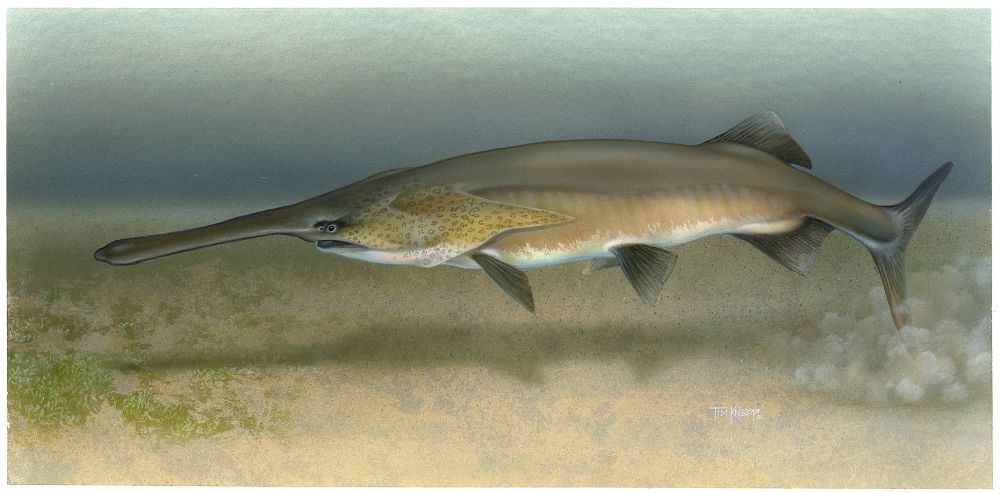
The Paddlefish belongs to the Polyodontidae family. The adult size is between 1.2 m to 1.8 m. It has a lifespan of 20 to 30 years. They spawn in April to May. It can be fished from mid-May to June. The long paddle-shaped snout of this fish represents about one-third of its total body length. The snout helps stabilize fish as they swim and also contains specialized cells that help detect swarms of plankton that this species feeds on. The skin is smooth. Small individuals are pink at the back and white at the base; for older people, around 25 à 30 cm, the body color changes to bluish grey on the back and cream on the vent. The eyes are small compared to the rest of the head and body. On the underside of the snout are two little barbells in front of a large, toothless mouth. When seen through the mouth, the gills are large and show the many closely spaced filaments that trap microscopic food. On each side, a gill cover extends backwards, ending with a long pointed flap. The skeleton is composed of cartilage rather than bone. The tip of the spine extends into the upper lobe of the heterrorcercal tail, much like a shark does.
The Paddlefish is a famous fish you can catch in Big Oak Flat.The Pacific Lamprey
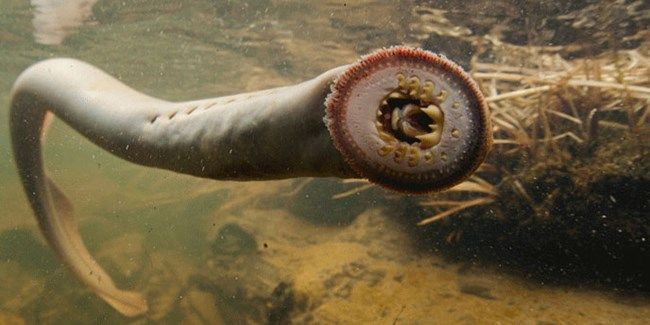
The Pacific Lamprey belongs to the Petromyzontidae family. The adult size of the pacific lamprey can reach 80 cm. It can live up to 5 years. The spawning period depends on the location. It can be caught between July and September when it enters freshwater. The Pacific Lamprey differs from other lamprey species in that it has three large, sharp anterior teeth located on the supraoral bar. Like all lampreys, they have seven breathable pores on each side of their bodies and a large suction disc that acts as a mouth. They are dark blue at the top and silver or white at the bottom. During the breeding season, Pacific lampreys turn reddish brown and the appearance of the sexes begins to differentiate as a pseudo-anal fin develops on the female. Their larvae are difficult to distinguish from those of other lamprey species.
The Pacific Lamprey is a famous fish you can catch in Big Oak Flat.Bitterling Fish
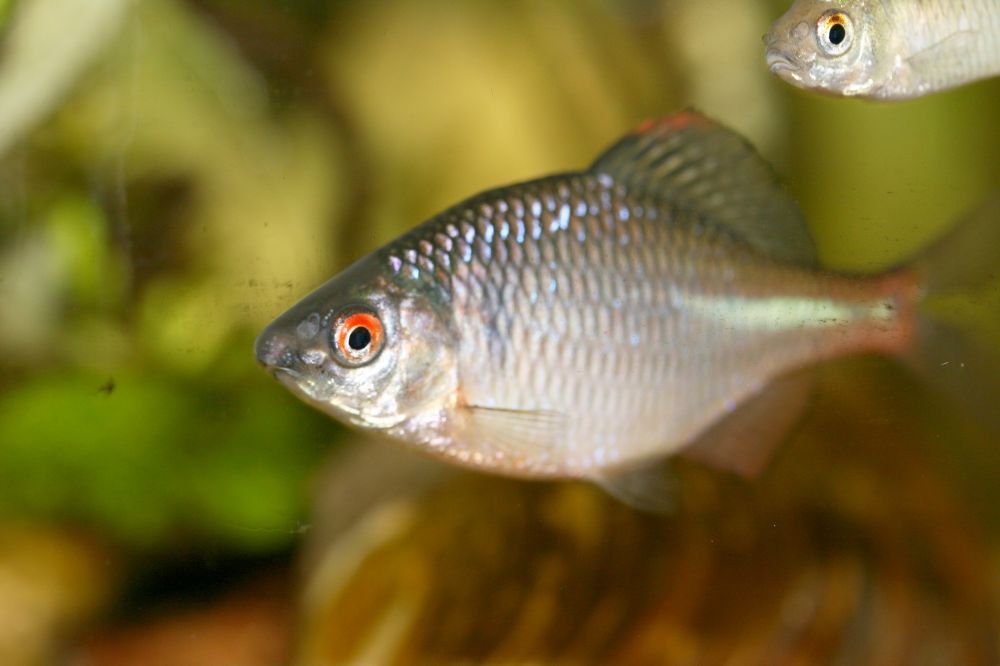
The Bitterling fish is a freshwater fish and belongs to the Cyprinidae family. Its scientific name is Rhodeus Amarus. The current size of the bitterling fish is 5-6 cm. Some individuals can reach a maximum height of 11 cm and a weight of 10 g. This species is one of the smallest Cyprinid in Europe. It lives on average from 2 to 3 years. The spawning period is between April and June. It lays 40 to 100 oocytes. This fish is easy to catch due to its small size. The bitterling is a small fish whose body is high and laterally compressed. The lateral line is short or incomplete. The scales on the back have a grey-green coloring. The sides are clear with silvery reflections. During the breeding period the silver coloration changes to a pink to bright red color with a dark blue sideband. Sexual dimorphism occurs between the male and female during reproduction. A 5 to 8 mm laying tube (ovipositor) develops in the female, which allows her to lay her eggs in the gill cavity of freshwater mussels. The male has a higher body than the female and its colors become brighter during the breeding season. The bitterling fish's eyes are quite large. Its mouth is small, oblique and the upper jaw protrudes beyond the lower jaw. The anal and dorsal fins have a short base and 8 to 10 branched rays.
Bitterling Fish is a famous fish you can catch in Big Oak Flat.Our fishing forecast of Big Oak Flat indicates the best time to go fishing in this city.
Our fishing forecast of Big Oak Flat indicates the best time to go fishing in this city.
Our fishing forecast of Big Oak Flat indicates the best time to go fishing in this city.
